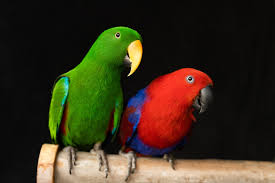
Eclectus
Conditions of detention
Eclectus parrots require a spacious cage that allows for ample movement and play. The cage should be equipped with sturdy perches, toys, and various enrichment activities. It’s important to place the cage in a well-lit area away from drafts and direct sunlight, as Eclectus parrots thrive in stable environments.
Useful Fact: Eclectus parrots benefit from several hours of supervised out-of-cage time each day for exercise and social interaction, which is crucial for their mental and physical health.
Nutrition and diet
Eclectus parrots have a specialized digestive system that requires a diet high in fiber and low in fat. Their diet should consist of fresh fruits, vegetables, and sprouts, with pellets making up a smaller portion of their diet. Leafy greens, carrots, bananas, and mangoes are excellent choices for providing essential vitamins and nutrients.
Useful Fact: Eclectus parrots have a longer digestive tract than other parrots, which allows them to process fiber-rich foods more efficiently. It’s important to offer a variety of fresh produce daily.
Health
Eclectus parrots are generally healthy birds but can be prone to certain health issues such as nutritional deficiencies, feather plucking, and toe-tapping or wing-flipping syndrome, often linked to dietary imbalances. Regular veterinary check-ups and a balanced diet are crucial for maintaining their health.
Useful Fact: Due to their unique dietary needs, it’s essential to avoid vitamin and mineral supplements unless specifically recommended by a veterinarian, as over-supplementation can lead to health issues.
Grooming and care
Eclectus parrots require regular grooming, including nail trimming and bathing to maintain feather health. They often enjoy bathing in shallow dishes or being misted with water.
Useful Fact: Eclectus parrots have a unique feather structure that gives them a silky appearance and less powder than other parrots, making regular bathing important for maintaining their plumage.
Education and training
Eclectus parrots are intelligent and can be trained to perform tricks, solve puzzles, and mimic sounds. Positive reinforcement techniques work best, and they benefit from mental stimulation and social interaction.
Useful Fact: Training sessions should be kept short (10-15 minutes) and consistent, focusing on positive reinforcement to encourage good behavior and learning.
Toys and entertainment
Toys are essential for keeping Eclectus parrots entertained and mentally stimulated. They enjoy a variety of toys, including puzzle toys, foraging toys, and toys that encourage chewing and manipulation.
Useful Fact: Rotate toys regularly to maintain interest and prevent boredom, which can lead to destructive behaviors like feather plucking.
Safety
Ensure the living environment is free from hazards such as toxic plants, fumes from non-stick cookware, and small objects that could be ingested. The cage should be secure with appropriate bar spacing to prevent escape.
Useful Fact: Eclectus parrots are curious and may chew on electrical cords, so keep cords out of reach to prevent accidents.
Accessories
Essential accessories include sturdy perches, food and water dishes, and a variety of toys. Natural wood perches of varying diameters are beneficial for foot health.
Useful Fact: Using perches made of different materials can help prevent pressure sores on the feet and provide exercise for the Eclectus’s muscles.
Socialization
Eclectus parrots require significant social interaction to thrive. They form strong bonds with their human companions and can become lonely or depressed if left alone for extended periods.
Useful Fact: Spending quality time with your Eclectus parrot daily, including talking and playing, helps meet their social needs and strengthens your bond.
Travel and Transportation
When traveling, use a secure and well-ventilated travel cage. Acclimate your Eclectus parrot to the travel carrier before trips to reduce stress.
Useful Fact: Cover the travel cage with a light cloth during transport to minimize stress and provide a sense of security.
Behavior and psychology
Eclectus parrots are intelligent and can exhibit complex behaviors. Understanding their body language and vocalizations is crucial for effective communication and care.
Useful Fact: Eclectus parrots are known for their calm and gentle demeanor, but they can become stressed if their environment or routine changes abruptly, so maintaining consistency is important.
Legal aspects
In most areas, there are few legal restrictions on keeping Eclectus parrots as pets, but it is important to ensure that any Eclectus parrots purchased are from reputable breeders or pet stores and not taken from the wild.
Useful Fact: Always check local regulations to ensure compliance with laws regarding pet ownership and breeding, as some areas may have specific requirements.


